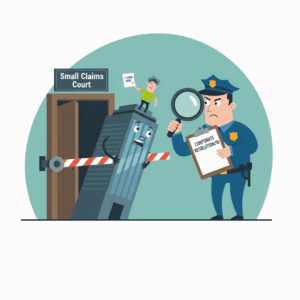What is a Corporation?
- Corporations are interesting legal entities. In the eyes of the law, they are persons. Accordingly, corporations have the right to pursue legal action in court through a representative. As with individuals, to pursue its interests in a court of law, the corporation must, in fact, exist.
- In a corporation’s case, “existence” means registration with relevant authorities as a provincial or federal corporation.
- Being sued by a non-existent corporation is akin to being sued by a person who never existed. This makes the issue of whether a corporation legally exists very important to any small claim or defence.
If a Corporate Plaintiff Does Not Exist.
- If you find out that a corporation has no registration anywhere in Canada, “the plaintiff does not exist” will make for an excellent defence to any claim. In fact, this is the first defence you should consider.
- We recommend conducting an official check to verify whether a corporation exists, regardless of how certain you may be of its legal status.
- For example, we had a case in our practice where a small claim defendant signed a contract with the corporate plaintiff. That corporate plaintiff then sued the defendant. It maintained its existence throughout the trial. The corporate plaintiff hired paralegals and a lawyer who claimed to represent it. After all that, the defendant checked whether the corporation was legally registered. It turned out that it never existed. Therefore, the corporation could not have sued the defendant, hired a representative or issued any other court proceedings. It could not even accept payment on a judgment in its favour.
If a Corporate Defendant Does not Exist.
- If you are on the other side and are suing a corporation, it’s equally important for you to check whether the corporation exists.
- Again, fairly common sense – a judgment against a person that does not exist is useless. You would not be able to collect any money from a non-existent entity. Attempting to rename the defendant after the judgment is a cumbersome and potentially unsuccessful process.

How to Verify if a Corporation Exists.
- It’s important to note here that any plaintiff or defendant must check that the corporation exists.
- So, now that we’ve established that checking the corporation’s existence is important; let’s turn to the mechanics of this check. A corporation can be provincial or federal. It means that is; it can be a company operating in a province or all of Canada.
- To show that a corporation does not exist, you must check both the provincial and federal databases.
How to Check an Ontario Provincial Corporation
- Provincially, this registration can be verified by conducting a search using the corporation’s name through the Ministry of Government Services. Additionally, anyone can search for it in person on the second floor at 375 University Avenue in Toronto (click here for more information from the Ministry).
- If the corporation exists or existed in the past, the Ministry will provide a Corporate Profile Report. This is an official document that confirms the corporation’s existence, lists its name, directors, shareholders, and officers, along with their contact details, and provides other relevant information. If the corporation has never existed, you can obtain a Certificate of No Record, which confirms this fact.
How to Check a Federal Corporation
- If a corporation does not exist provincially, it may be federal.
- A search for a federal corporation is free of charge. Anyone can run it using its name online here.
- The search will provide you with an informative search result similar to the corporate profile report if the corporation exists, and a “0 results” page if the corporation does not exist.
You can also avoid the hassles of running the searches yourself by hiring a business service provider who can run the search for you. A list of several providers can be found on the ServiceOntario website, though this list is not exhaustive.
To summarize, the moral of this particular story is that corporate identity checks are not expensive or difficult to run. For this reason, we strongly recommend that you conduct thorough research to avoid the risk of becoming embroiled in lengthy litigation with an entity that may not even exist.
Contact Spectrum Paralegal if you are involved in a litigation with a corporate entity that looks doubtful. We provide full representation in any Small Claims Court case, no matter how complex it is.
![]()






